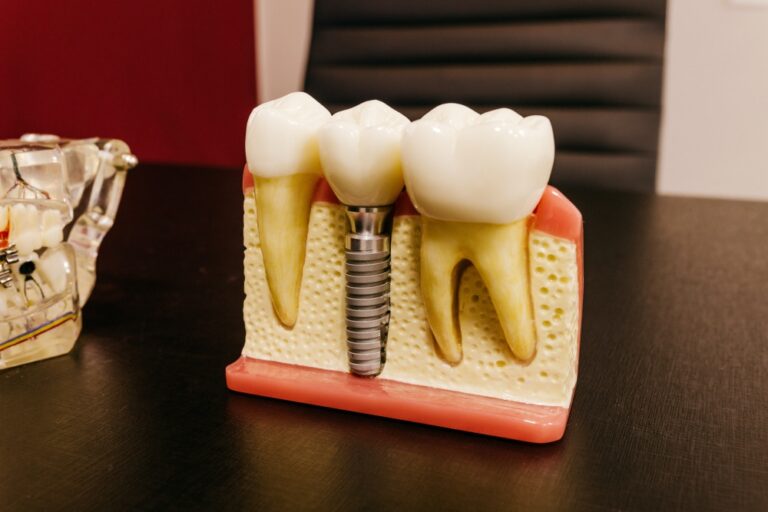Periodontal Disease and Overall Health: What You Need to Know
Periodontal disease and overall health are deeply connected. Yet, many Americans wait until they feel pain before seeking dental care. When chewing becomes uncomfortable or mouth pain keeps you up at night, it’s a sign to visit the dentist. Sadly, some serious dental issues don’t cause pain at all. Periodontal disease, especially, is almost always pain-free. It has few symptoms but can severely affect your body.
How Periodontal Disease Impacts Your Overall Health
When you get an abscess, infected wound, or pimple, your body sends white blood cells to fight the infection. These cells attack harmful bacteria or fungi. The leftover pus is made of dead skin cells, white blood cells, and germs. Pus drains out of visible wounds, but dental infections keep pus inside the body.
A dental abscess is an infection under the gums. It can result from gum injury, excess oral bacteria, a sugary diet, or poor oral hygiene. Many dental abscesses don’t cause pain, so they can go unnoticed for a long time.
This hidden infection produces a constant flow of pus inside your system. Your body cannot easily get rid of this waste. It can travel through your bloodstream and collect in arteries or organs. This spread can cause many different diseases.
Diseases linked to untreated periodontal disease include diabetes, heart disease, stroke, Alzheimer’s, rheumatoid arthritis, and pregnancy complications.
The Link Between Oral Bacteria and Your Body’s Well-being
Many patients see doctors for wounds or skin abscesses that don’t heal. These wounds are often hard to treat and may return repeatedly.
Unfortunately, doctors often treat the symptoms without finding the root cause. They prescribe antibiotics hoping the wounds will heal.
Sometimes, tests reveal that mouth infections cause these skin wounds. Oral bacteria can spread throughout the body and cause other health problems. When the mouth infection clears, the other wounds start healing too.
Studies have found oral bacteria in the heart tissue of heart attack patients and the brains of Alzheimer’s patients. There is also a clear link between oral health and diabetes. Improving oral health helps lower blood sugar levels.
Oral health also impacts blood pressure. Chronic oral infections cause inflammation, which raises blood pressure. Treating the infection can naturally reduce it.
Is Your Oral Hygiene Enough to Protect Your Overall Health?
Do you think you brush and care for your teeth properly? You might want a professional to check.
Most Americans brush for only one to two minutes. This time is often not enough to remove harmful plaque and bacteria.
We assume a quick brush is enough, but it’s not. Here are three simple steps to improve your oral health:
Step 1: Improve Oral Hygiene for Better Health
It takes about five to 10 minutes daily to clean your teeth well. Plaque and bacteria hide on and between teeth. Removing them properly is key to good oral health.
Brush thoroughly with your preferred toothbrush. Floss with dental floss or a water pick.
Try different dental tools to find what works best for you. One thorough cleaning is better than several rushed sessions.
Step 2: Self-Check Your Oral Care Effectiveness
Testing your knowledge helps, and the same goes for oral care.
Use a disclosing solution available in liquid or tablet form. This solution stains plaque and debris in your mouth.
Try it after a good cleaning session to see how well you cleaned your teeth. It helps identify areas where plaque often remains.
Step 3: Dental Visits Are Essential for Overall Health
Think of oral care as an investment in your health.
Dental visits aren’t free, but regular checkups ensure your mouth stays healthy.
Good oral health protects not just your teeth and gums, but your entire body from many diseases.
Think Again About Oral Health and Overall Health
It’s time to take a minute and think about oral health differently.
A healthy mouth means more than a nice smile. Bacteria and infections in your mouth can affect your whole body.
Educate yourself and your loved ones about good oral care. It reduces the risk of periodontal disease and supports overall health.
Share your concerns about oral health with your family doctor.
At The Dental Medical Convergence, we aim to educate the public about how oral health relates to overall health. We also work to bring dentists and doctors together.
When these professionals share information about patients, they can prevent and treat diseases more effectively.
This collaboration will improve national health and lower oral health-related diseases worldwide.
Think this is far-fetched? With your help, it’s possible.
For more on oral and overall health, visit The Dental Medical Convergence.
Learn more about the link between gum disease and heart health at the American Heart Association.




